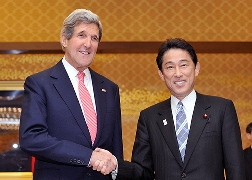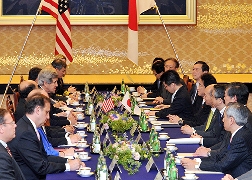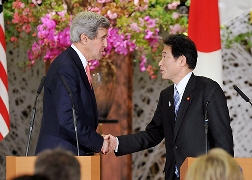Countries & Regions
Japan-U.S. Foreign Ministers' Meeting



On Sunday, April 14, for approximately an hour and 35 minutes from 5:35 p.m., Minister for Foreign Affairs Fumio Kishida held a meeting with U.S. Secretary of State John Kerry. The outline of the meeting is as follows.
- Initial Remarks
Minister Kishida opened the meeting by welcoming Secretary Kerry's visit to Japan as part of his first trip to Asia since taking office. Minister Kishida said he hoped to discuss the situation in the Asia-Pacific region, reaffirming the role of the Japan-U.S. alliance in the region and the U.S. commitment. In response, Secretary Kerry noted that he had just had a meeting with Minister Kishida the other day in London, following the meeting in Washington D.C. in February, and that it was not a coincidence that the foreign ministers of both countries met before and at the end of Secretary Kerry’s overseas trip. Rather, he said, it was an evidence of the high value the United States places on its relations with Japan.
- Japan-U.S. Relations in General
(1) Strengthening Multilayered Bilateral Exchanges and Dialogue
(a) Minister Kishida said there had been frequent exchanges of senior officials between Japan and the United States since the administration of Prime Minister Shinzo Abe had started. He extended to U.S. President Barack Obama a renewed invitation to visit Japan, based on the Japan-U.S. Summit Meeting in February this year. To strengthen Japan-U.S. policy dialogue, Minister Kishida proposed holding frequent dialogues between the Deputy Minister for Foreign Affairs in charge of political affairs and the U.S. Undersecretary of State, on top of the existing framework for strategic dialogue between the Vice Minister for Foreign Affairs and the U.S. Deputy Secretary of State. Moreover, he stressed the importance of promoting exchanges between Japanese and U.S. politicians, and introduced a bilateral exchange program of about 5,000 youth from both countries, the first round of which would take place next month. He added that he hoped to develop this into a wonderful program in cooperation with the United States.
(b) Secretary Kerry replied that these are all good initiatives and he welcomed them. Regarding youth exchanges, he noted that he had heard about the decline in the number of Japanese and U.S. students studying in each other's country and that he hoped to consider ways to resolve this issue.
(2) Cyber and Space Cooperation
(a) The two ministers shared their views on holding a meeting on Japan-U.S. Cyber Dialogue in Tokyo on May 9 and 10, 2013. (Note: Through the dialogue, Japan and the United States intend to promote cooperation in areas such as: (1) sharing the recognition of threats; (2) concrete measures in cyber domain, including the protection of critical infrastructure; (3) international rule-making.)
(b) Regarding space, the two ministers shared their views to promote concrete cooperation based on the Comprehensive Dialogue between Japan and the United States held in March this year and, as the first step, to work toward an early signature and conclusion of agreement regarding Space Situational Awareness (SSA) cooperation.
(3) Hague Convention
Secretary Kerry raised the issue of the Hague Convention on the Civil Aspects of International Child Abduction (the Hague Convention). Minister Kishida said that the government had had already submitted the Convention and a draft domestic implementing law to the Diet, and that the deliberations at the Diet had already started. He noted that the government will continue its efforts so to have approval by the Diet during the current ordinary session.
- Security (Realignment of U.S. Forces)
(a) The two ministers highly evaluated the steady progress made on the relocation of the Marine Corps Air Station (MCAS) Futenma and consolidation plan for facilities and areas in Okinawa, in line with the agreement reached at the Japan-U.S. Summit Meeting in February.
(b) Minister Kishida stated the importance of steadily implementing the relocation of U.S. Marines Corps from Okinawa to Guam and asked Secretary Kerry to help to gain U.S. congressional support for the relocation. Secretary Kerry expressed his understanding and indicated his readiness to hold discussions with the Congress.
- Economy (TPP)
(a) Minister Kishida stated that the conclusion of the bilateral consultations on the Trans-Pacific Partnership (TPP) had paved the way for Japan's participation in the TPP negotiations. He explained that the Japanese government had made its decision based on the strategic importance of Japan’s participation and from the perspective that this would contribute to strengthening the Japan-U.S. alliance. He asked for the cooperation of Secretary Kerry in making t progress in the domestic process of the United States and of the other participating countries to ensure Japan's early entry to the TPP negotiations.
(b) Secretary Kerry replied that he welcomed Japan's participation in the TPP negotiations and appreciated the conclusion of the bilateral consultations. He showed understanding towards the requests made by Minister Kishida.
- Situation in the Asia-Pacific Region
(1) North Korea
(a) Secretary Kerry briefed Minister Kishida on details of his visits to the Republic of Korea and China. He briefed he had had confirmed the commitment of the two countries to aiming at the denuclearization of the Korean Peninsula. The two ministers had in-depth discussions on ways to forestall nuclear development by North Korea. To this end, they agreed to hold consultations of high-level officials from Japan and the United States and to further promote cooperation between Japan, the United States and the Republic of Korea.
(b) Minister Kishida called for the continued U.S. understanding of and support for Japan's efforts on the issue of abductions of Japanese citizens by North Korea. Secretary Kerry said Japan had support by the United States completely and that he knew how the families of abduction victims felt. He added that he would keep making serious efforts to tackle this issue.
(2) China
(a) Secretary Kerry expressed his hope that the issue of the Senkaku Islands should be settled through high-level dialogues between Japan and China. He made it clear that there would be no change at all in the United States' position on the Senkaku Islands, including the application of Article 5 of the Japan-U.S. Security Treaty to Senkaku Islands. (At the joint press conference with Minister Kishida, Secretary Kerry clearly stated that the Senkaku Islands are under the administration of Japan and that the United States opposes any unilateral actions that would aim at changing the status quo.)
(b) Minister Kishida explained that Japan would not make any concessions on Senkaku Islands, but that it was always keeping its door open for dialogue, and that Japan had conveyed this message to China. He stated that Japan had proposed to China that they should reaffirm their “Mutually Beneficial Relationship based on Common Strategic Interests” from a broad standpoint and then hold dialogues.
(3) ASEAN and other countries
(a) Minister Kishida said that Japan was also conducting active diplomacy in the Asian and Oceania region, not only for the Korean Peninsula and China, based on the Japan-U.S. alliance as the linchpin. He pointed out that the Abe administration attached importance to Japan's relations with ASEAN as this year marks the 40th anniversary of Japan-ASEAN friendship and cooperation. He added that it was Japan's hope that Japan and the United States would together strengthen coordination with ASEAN.
(b) In addition, Minister Kishida stated that Japan hoped to work closely with the United States on issues related to Myanmar, India, Pakistan, and Pacific island region, among others.
- Situation in the Middle East
(1) Syria and Jordan
Secretary Kerry appreciated the measures Japan had taken toward the situation in Syria, including humanitarian assistance. In reply, Minister Kishida said he was concerned about the influence of the surging numbers of Syrian refugees on surrounding countries, especially the difficulty in Jordan. He highly evaluated the assistance of 200 million dollars to Jordan announced by President Obama. Both ministers agreed on the importance of assistance to Jordan.(2) Middle East Peace Process
Secretary Kerry said he hoped for involvement by Japan in the Middle East peace process and expected the participation by Japan in the economic initiatives that Secretary Kerry recently announced. In response, Minister Kishida stated Japan was ready to substantially engage in an international framework to support the peace process. He said Japan expected to cooperate closely with the United States, including coordination between Japan's efforts to assist Palestine and Secretary Kerry's initiatives. - Climate Change
The two ministers agreed to start a new working-level dialogue between Japan and the United States on climate change, an issue of common interest for the two countries, and to release a "U.S.-Japan Fact Sheet on Climate Change Cooperation" as attached.

